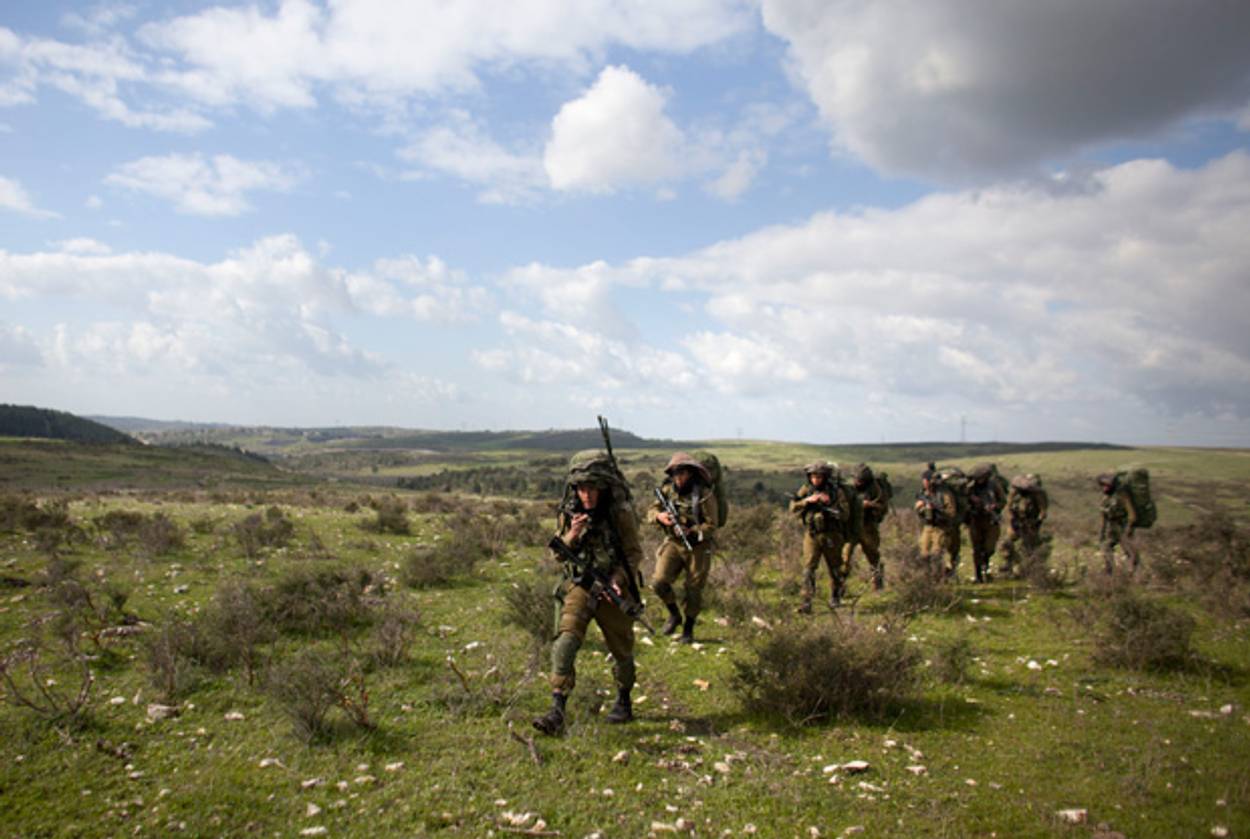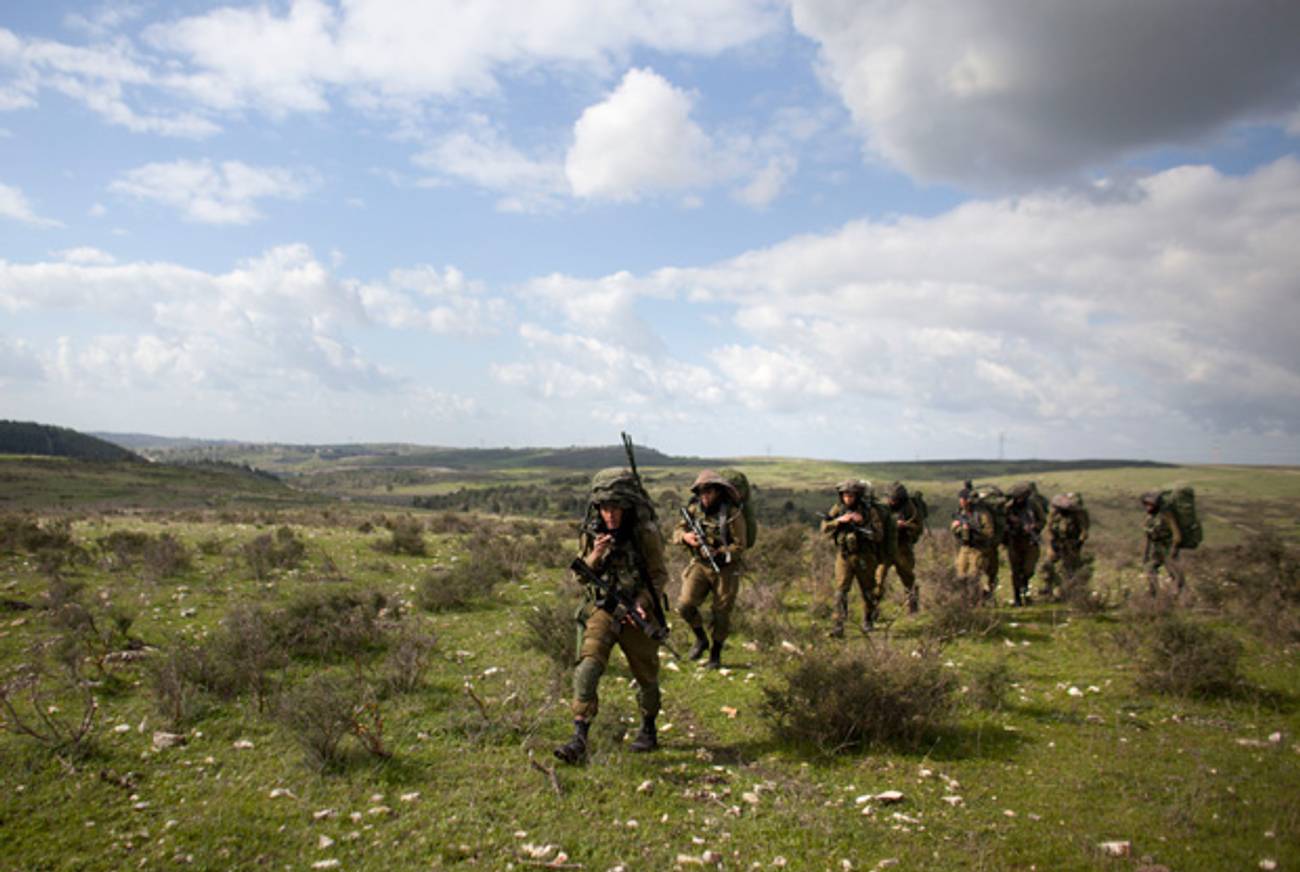IDF Vets Fight for Better P.R.
Tired of being portrayed as ‘bloodthirsty murderers,’ three former infantrymen launch a website to help improve the image of Israel’s military




These days, winning a war is not only a matter of beating the enemy on the battlefield. Armies have to win public-relations battles as well—and in this realm, the Israel Defense Forces has taken a beating. In international news stories, YouTube videos, Twitter, and Facebook—especially since the 2006 war against Hezbollah in Lebanon, Operation Cast Lead in 2009 against Hamas in the Gaza Strip, and the Turkish flotilla incident in May 2010—Israeli soldiers are routinely portrayed as needlessly brutal, using excessive force against civilians to achieve their military goals. The Israeli government’s attempts to rectify such images have been so bumbling and unsuccessful that the Hebrew word for P.R., hasbara, has taken on a derogatory connotation.
The stigmatized reputation of the IDF prompted three friends and recently discharged infantrymen—Daniel Nisman, Josh Mintz, and Yagil Beinglass—to take matters into their own hands by launching the website Friend-A-Soldier, a year ago. The site encourages people from around the world to connect directly with former IDF soldiers. “Take our challenge—ask us anything,” the site says.
Since it began, the website has received thousands of emails from people in 148 countries, including Syria and Yemen. Visitors can direct questions to specific soldiers, whose photos are on the site. The soldiers then post the questions and responses—on subjects ranging from the Arab Spring to Zionism—which all visitors to the site can see. There are also videos of the soldiers and weekly live chats. Twenty-five former IDF soldiers (mostly men, and a few women) volunteer for the site, which has no government funding and doesn’t have a single party line.
London émigré Josh Mintz, 27, said that he teamed up with American-born Nisman, 25, and Beinglass, 26, while the three were classmates at the Interdisciplinary Center in Herzliya. They were all “distraught by the way IDF soldiers were vilified—and frustrated by the lack of effective responses.” They kept “getting into long-winded discussions on Facebook” with IDF detractors. They were constantly debunking “the portrayal of Israeli soldiers as bloodthirsty murderers,” according to Mintz, so they decided to start a website of their own.
“It’s a brilliant setting to discuss difficult questions in a respectful, meaningful way,” Ludwig, a 40-year-old commenter from Germany, wrote on the site. “Other options of dialogue like blogs and newspaper talkbacks usually end up with the exchange of hateful rants between extremists.”
The founders told me the most frequently asked question is: “Why do Israeli soldiers kill children and babies?” Nisman says the people who pose that question are exactly the people he and his friends created the website for. “Nobody wants to hear about how Israel invented the cherry tomato,” he said. “They don’t care about how we invented the cell phone. They’ll ask, ‘What are Israeli soldiers doing to Palestinian children?’ ”
Even if the query sounds rhetorical and smacks of a medieval blood libel, the soldiers try to respond in the most respectful way possible. Sample answer from a volunteer named Gal: “I haven’t killed any children or anybody else for that matter, nor has anybody that I know.” (Volunteers’ last names are not used, to protect their privacy.)
The site is open to any solider who can write in English. Volunteers are given a few sample questions to test their writing ability but, said Gal, a former sergeant, “nobody’s telling me what I should and should not write.” One volunteer included a video clip released by the Air Force that shows Hamas fighters using women and children as human shields. The volunteers correspond in English, French, German, and Spanish; the co-founders are currently looking for Bedouin and Druze soldiers to write in Arabic on the site along with under-represented soldiers from Ethiopia and Russia. (The fact that most of the correspondence is done in English is a drawback to the average soldier.)
When they first started the website, Nisman said he was accused by some Israeli acquaintances of naïvely trying to reach out to people who would “hate us no matter what.” Gal says that’s precisely the point. “Muslim men and women are writing to me,” she said. “I don’t care what their agenda is. If it weren’t for this site, we would have no interaction whatsoever.”
For Mintz, who served in a demolitions platoon of an infantry unit, framing the conflict within a personal conversation is the reason the site is successful. In his experience, many of the conversations begin with accusations and then move toward “mutual understanding.”
Mintz is outspoken in his views about what’s happening in Israel and the Middle East. “If we’re going to turn on the light switch, then let’s illuminate the room,” was how he put it when he appeared on a live Al Jazeera show in June 2011, where he fielded questions from three interviewers along with viewers who said they were appalled to see him on the show. Mintz didn’t let it get to him. “I wanted to show that we’re not beasts and baby-killers and that we want peace,” he said.
Friend-A-Solider makes a point of publishing photographs of soldiers in uniforms on its home page and then individual photos of the volunteers in their civvies with a description of where they work or study and their interests. Gal, for example, wrote that she studied in Shanghai and now “enjoys dining out with good friends, touring, reading, shopping, and simply enjoying life in Israel.”
Another volunteer, Itay, said that because he was born in Israel—as opposed to the three founders and about half the other volunteers—his answers have more “Israeli chutzpah and irony.” When a woman named Olivia, who described herself as a “half-Swedish and half-Maltese” dancer living in Tel Aviv, asked: “How do you feel about your children having to join the army in the future?” Itay responded: “All Israeli parents tell their children that their children won’t have to serve in the army. All Israeli parents turn out to be liars.”
The site “puts a mirror in front of your face,” said Itay, who now works as a journalist, “and forces you to think.” Another volunteer, Lirut, who served as a sergeant in an army operation command center and is now a communications student, said that since she began volunteering on the website, she’s started to educate herself more about issues. She recently received a question about AIPAC and its role in Israeli politics and wants to research the topic before responding. “Israel is very important to me,” she said, “but I’m trying to be objective, not defensive or offensive, even when people get hostile with me.”
Some correspondence ends with a smiley-face icon, but most conversations drop off at a point where, Gal said, “we agree to disagree.” The website’s challenge is to take the correspondents’ mutual misunderstandings, their opposing narratives, and clashing memories and bring about some kind of resolution. But a website can only do so much.
While Nisman sincerely believes that the website could spark a grassroots peace movement—he dreams of correspondents meeting up in Cyprus—other volunteers have less ambitious goals. “I don’t think it has such an effect on the countries but it could make a change on two people,” Itay said. “I don’t try to bring about world peace through my answers. I just try to touch someone.”
Diana Bletter is a writer based in the Western Galilee and author of the forthcoming memoir, The Mom Who Took Off On Her Motorcycle. She blogs at The Best Chapter.
Diana Bletter is a writer based in the Western Galilee and author of the forthcoming memoir, The Mom Who Took Off On Her Motorcycle. She blogs at The Best Chapter.